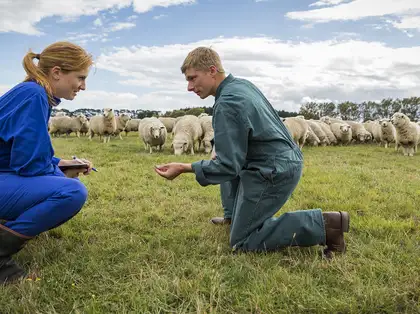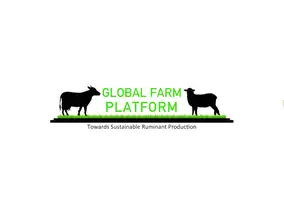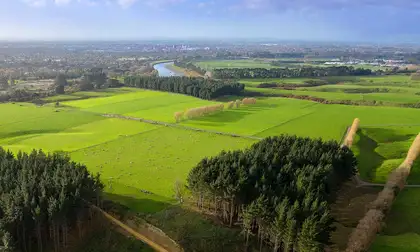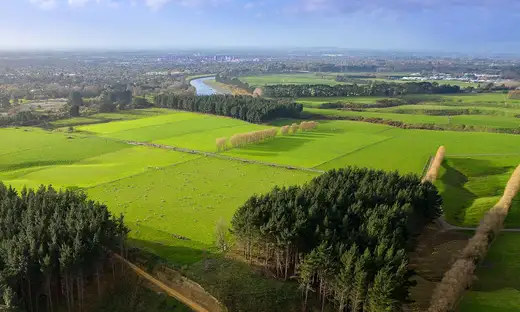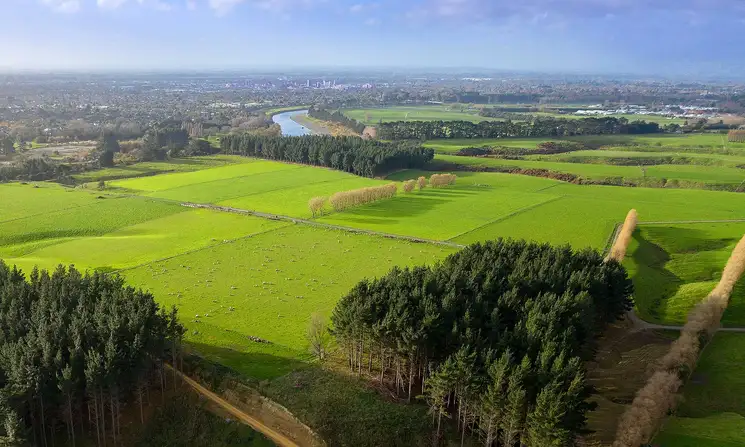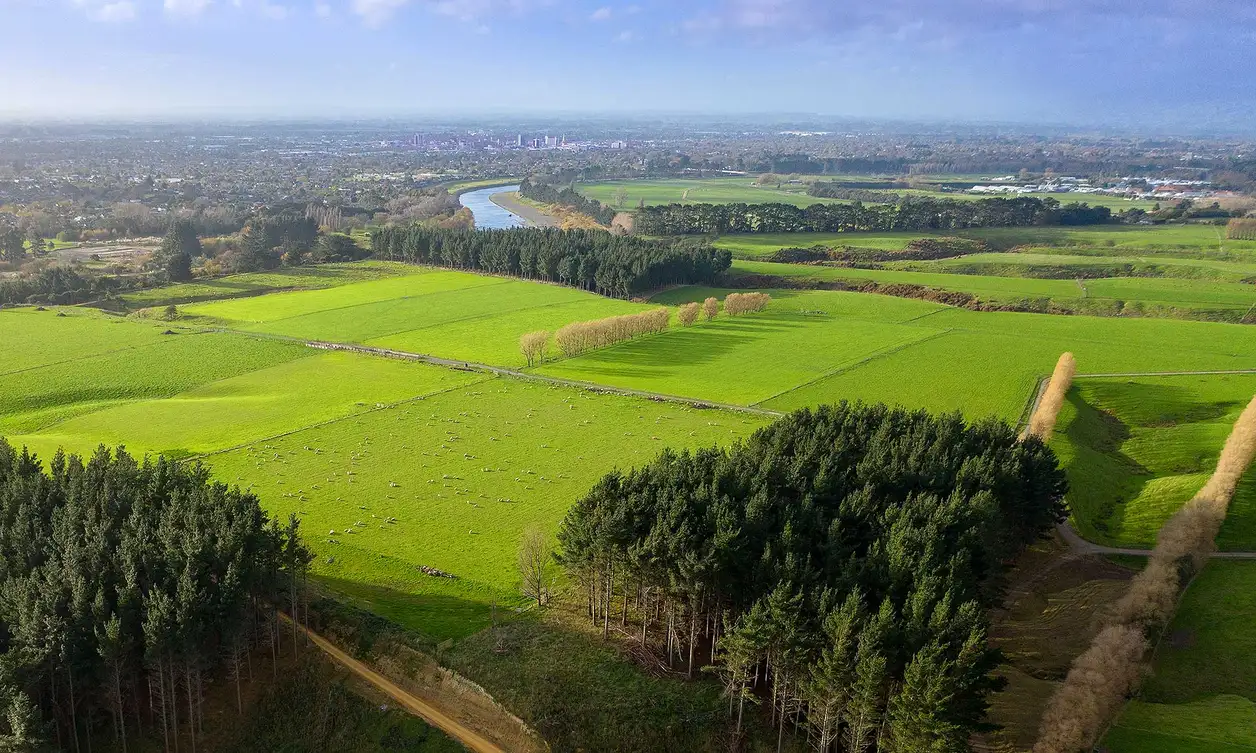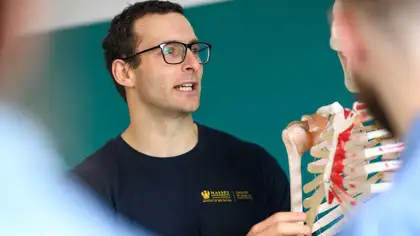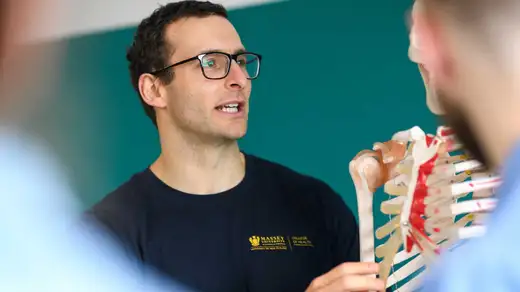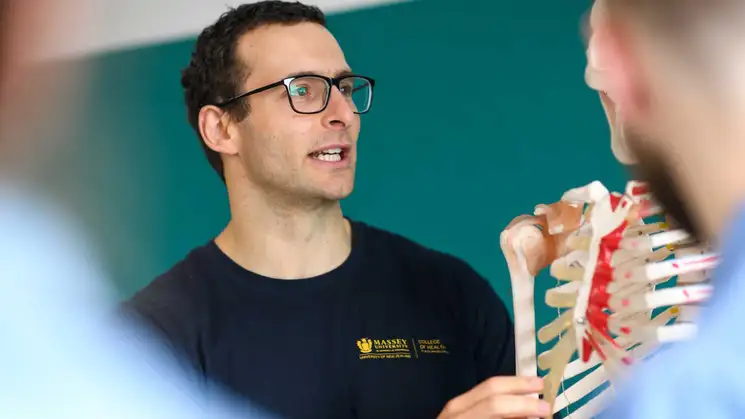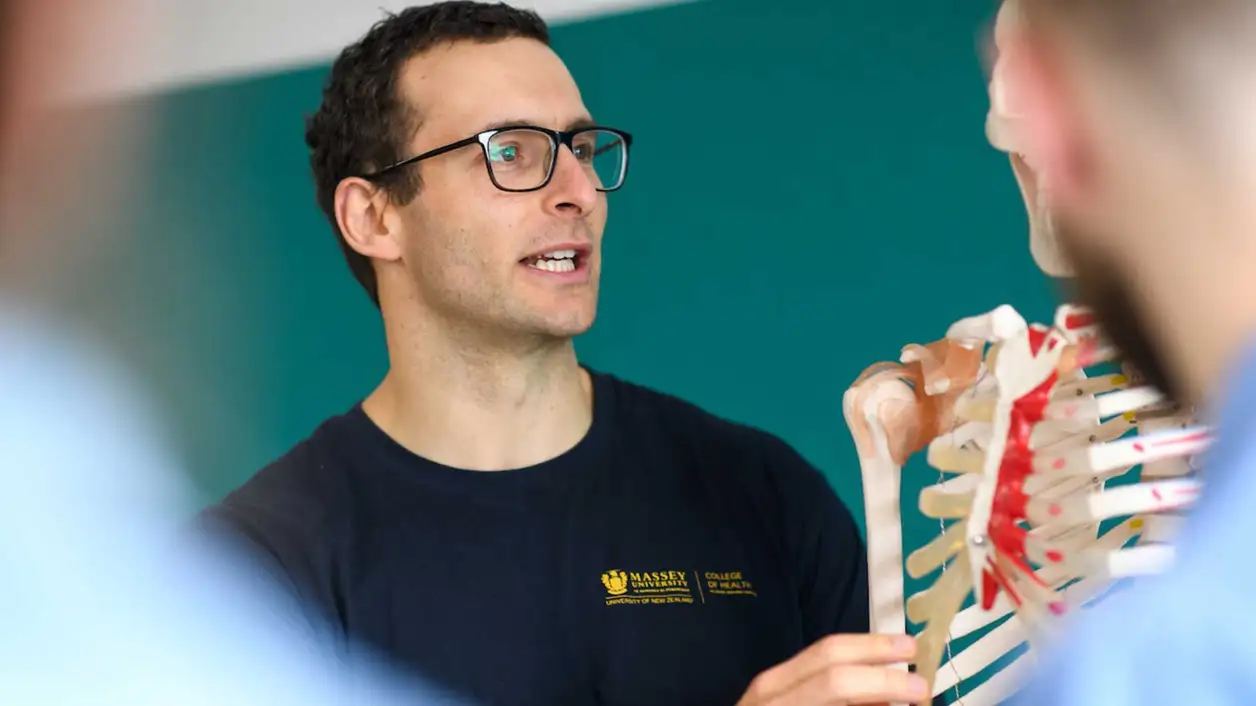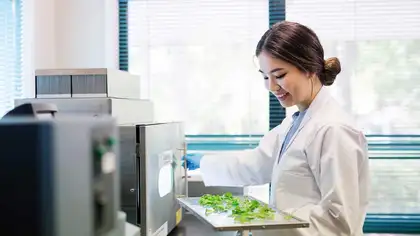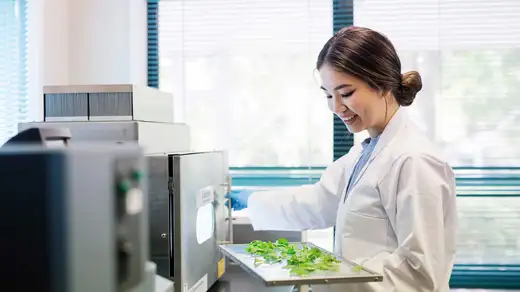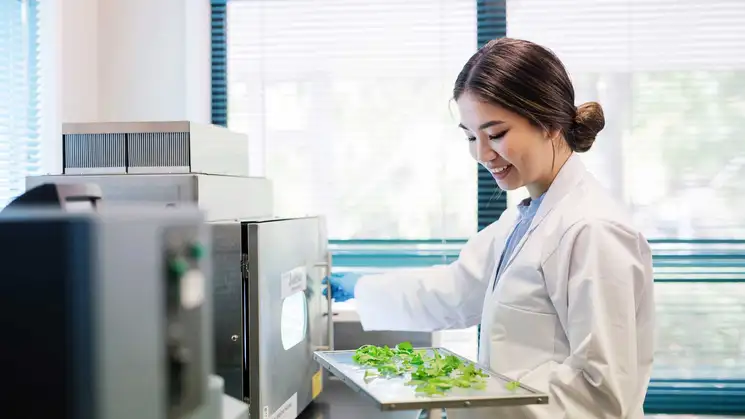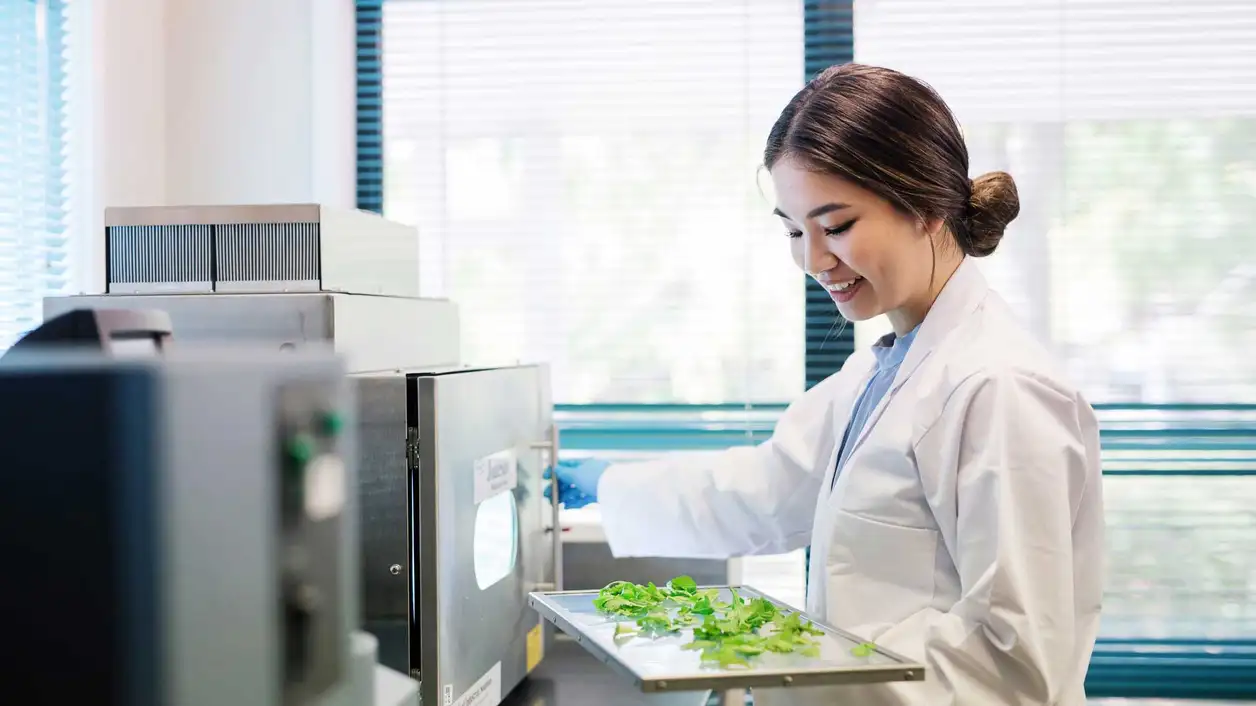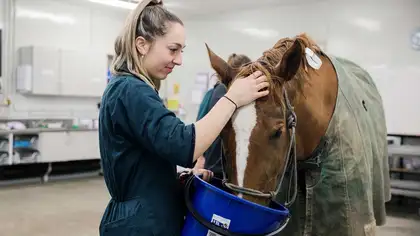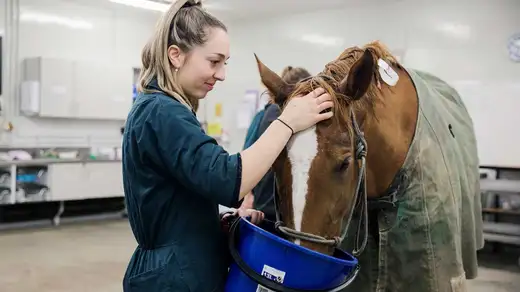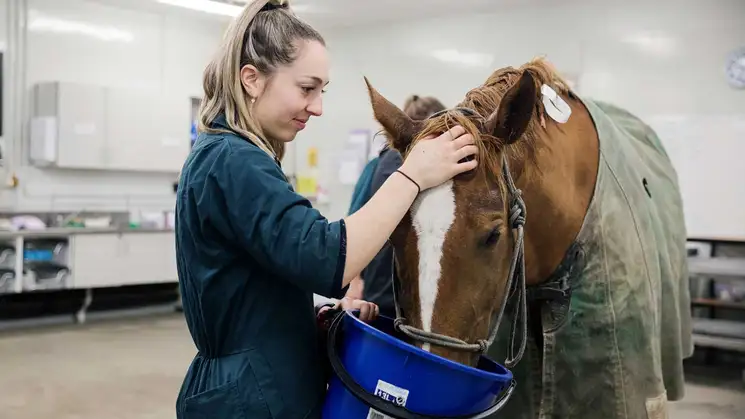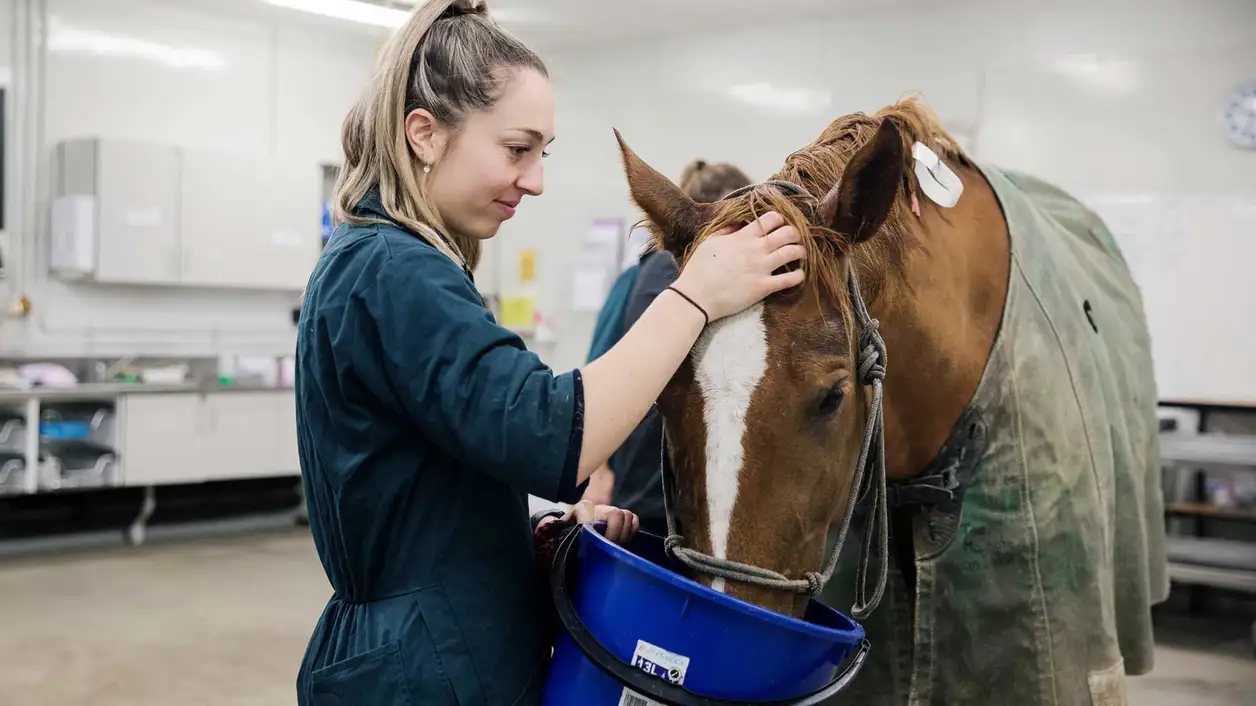Be unique
Massey offers more animal degrees than any other New Zealand university, including the only dedicated animal science degree.
We go way back
Animals are in our DNA and have been since 1927 when we first started offering agricultural and animal-related degrees.
Global recognition
Our qualifications in this area are accredited by international industry bodies, so you can work in New Zealand and overseas.
Get ahead at work
Expand your existing expertise at work or advance your career with Massey. Or change direction with a new qualification.
Overview
Animals are in our intellectual DNA – we've offered animal-based agriculture degrees since 1927.
Learn from world-class lecturers and researchers with industry experience across all our animal-based qualifications. Our research and teaching staff cover areas such as:
- veterinary science
- animal behaviour and welfare
- equine science
- infectious diseases
- anatomy
- animal development and physiology
- livestock production
- biosecurity
- marine biology
- animal ecology
- wildlife biology
- zoology.
Discover new ideas in areas such as animal nutrition or genetic technologies. Talk to our lecturers who have examined wildlife migration pathways across the world, have pioneered a new surgery, helped protect Aotearoa New Zealand’s wildlife, or improved the nutrition of your pet cat.
From small to large animals, including our native taonga species, get hands-on experience at our world-class animal facilities. Our cat and dog facilities and Massey's on-site farms are unique. We have over 2000 hectares of farms that look after herds of dairy cows, deer and flocks of sheep. Alpacas, donkeys and pigs are all resident.
Our one-of-a-kind Companion Animal Hospital, Farm Veterinary Service, Wildbase Wildlife Hospital and Equine Veterinary Clinic are all based on our Manawatū campus and serve the local and national community.
Master new skills in state-of-the-art laboratories and other research facilities. Our zoological species collection is here to aid your studies.
Animal degrees are a good fit if you:
- do well in sciences and maths
- want to work with animals and contribute to the economy
- care about animals and want to protect them
- like solving problems and tackling challenges.
Animal courses may cover:
- animal welfare and wellbeing of companion animals (pets) and farm animals
- biodiversity and conservation
- equine science
- food production from animals such as cattle, pigs, poultry and sheep
- genetics and breeding
- nutrition and growth
- animal evolution
- marine biology, ornithology and entomology
- veterinary infectious disease
- clinical studies.
Coursework covers a wide range of animals including:
- companion animals (pets) such as cats and dogs
- farm animals, including cattle and sheep
- horses and other animals used in sports
- native species such as birds and reptiles.
We have strong partnerships with the animal sector to keep courses up to date and relevant — and offer practical learning with field trips including:
- local businesses such as livestock farms and Kraft Heinz Watties
- Massey's farms and companion animal research facilities.
How you can study animals at Massey
Discover what we offer if you’re interested in studying animals – whether you’re coming to university for the first time, changing direction or returning to advance your study or career.
Undergraduate study
Bachelor's degrees
Bachelor of Agricultural Science – BAgSci
Massey’s Bachelor of Agricultural Science will give you the contemporary agriculture-related skills you need to become a leader in this rapidly growing international industry.
Bachelor of Animal Science – BAnSci
Combine your love of animals and science with the only animal science degree available in New Zealand.
Bachelor of Veterinary Science – BVSc
By studying veterinary science at Massey University, you’ll join a world-leading veterinary qualification that will qualify you to work as a veterinarian in many different areas.
Animal Genetics and Breeding – Bachelor of Animal Science
Learn how animal breeding and genetics can have a positive impact on animal industries and the New Zealand economy.
Animal Nutrition and Growth – Bachelor of Animal Science
Combine your love of animals and science with the only animal science degree available in New Zealand. This degree focuses on how nutrition contributes to the performance and health of animals.
Animal Welfare – Bachelor of Animal Science
Keen to make a difference in the lives of animals? Combine your love of animals and science to make a difference to their health and welfare.
Equine Science – Bachelor of Animal Science
Gain the knowledge base and the analytical and management skills for a career helping improve the productivity and sustainability of the equine industry.
Ecology and Conservation – Bachelor of Science
From molecules to forests, ecology is a broad discipline that teaches you how to make sense of the interactions between organisms and their environment.
Zoology – Bachelor of Science
Let your love of animals take you into a field that is in high demand throughout New Zealand. With Massey's Bachelor of Science (Zoology) you have the chance to learn everything there is to know about animals.
Undergraduate certificates
Certificate in Science and Technology – CertScTech
The Certificate in Science and Technology is a shorter study option at university level. It is used primarily as a ‘pathway’ to help you complete subjects you need to enter another qualification.
Graduate certificates
Graduate Certificate in Science and Technology – GCertScTech
Do you want to expand your knowledge or learn a new subject without completing a second bachelor’s degree? Massey’s Graduate Certificate in Science and Technology is a flexible postgraduate study option.
Undergraduate diploma
Diploma in Science and Technology – DipScTech
Undertake a shorter, more flexible study option with the Diploma in Science and Technology at Massey.
Graduate diplomas
Graduate Diploma in Science and Technology – GDipScTech
The Graduate Diploma in Science and Technology gives you the opportunity to retrain in an area of science that interests you.
Relevant undergraduate subjects to major or specialise in
When you apply to study at Massey, for some undergraduate qualifications you can choose what subject you’d like to specialise in. You can usually change your mind after you get to university, depending on the courses you enrol in.
Postgraduate study
Master's degrees
Master of Veterinary Medicine – MVM
Shaping the future of veterinary science: evidence to impact. This world-leading online education qualification attracts students from around the globe.
Master of Veterinary Studies – MVS
Progress your professional development by gaining expertise in a specific area of veterinary science.
Animal Science – Master of Science
Stand out from other animal science graduates with Massey's Master of Science (Animal Science).
Conservation Biology – Master of Science
With Massey’s Master of Science (Conservation Biology), you will learn how to address conservation management problems that are relevant to the world today.
Ecology – Master of Science
Explore the connections between living things and their environment with the Master of Science (Ecology).
Zoology – Master of Science
Take advantage of our zoology expertise and join New Zealand's most knowledgeable university for zoology-related topics.
Postgraduate diplomas
Animal Science – Postgraduate Diploma in Science and Technology
Join a world-leading agricultural university. Massey’s Postgraduate Diploma in Science (Animal Science) is a stepping stone to a research-based degree.
Conservation Biology – Postgraduate Diploma in Science and Technology
Learn to address real conservation management problems. The Postgraduate Diploma in Science and Technology (Conservation Biology) is a stepping stone to a research-based degree.
Zoology – Postgraduate Diploma in Science and Technology
The Postgraduate Diploma in Science and Technology (Zoology) is a stepping stone to a research-based degree. Take advantage of Massey’s experts who can help you dig deeper into your area of interest.
PhD and other doctoral degrees
Doctor of Philosophy – PhD
A prestigious research qualification that demonstrates your ability to carry out independent and original research in your chosen field.
Relevant research areas at Massey
Discover research expertise, projects and initiatives relating to animal science at Massey.
What our students say
“I loved my experience at Massey University, keeping busy with sport, study and Massey Young Farmer’s Club. My time at Massey University gave me friendships and skills that will last the rest of my life.”

“There was a significant practical component to the courses which I was very excited about, and they are designed to help you find your passion while at the same time develop key skills that you can contribute in the workforce.”

“I thoroughly enjoyed my 5 year degree at Massey. I made lifelong friends while learning essential knowledge and skills which have helped me to start my new career.”

Our facilities
You'll have access to a wide range of first-class facilities when you study with us.
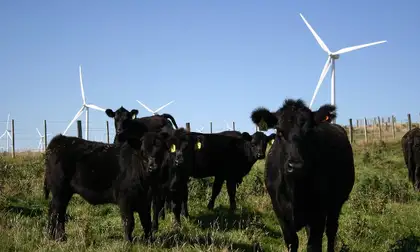
Massey Farms
Students and researchers can access 2,000 hectares at our six working farms, including:
- dairy farms
- sheep and beef farms
- deer breeding unit
- mixed enterprise and cropping unit.
Location: Manawatū campus
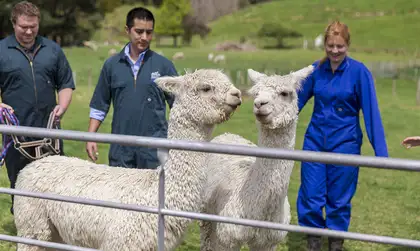
Large Animal Teaching Unit (LATU)
This is a dedicated facility to help train Massey veterinary students in aspects of large animal handling and examination across a range of species.
The facility includes a small working farm with horses, cattle, sheep and camelids. A range of veterinary procedures are taught as students progress through their course.
Location: Manawatū campus
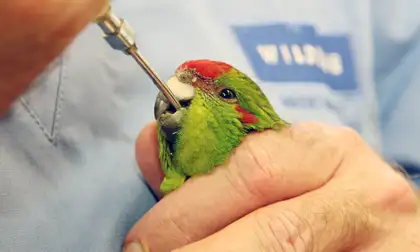
Wildbase Hospital
A specialist hospital for wildlife, with equipment and facilities including:
- 5 patient wards to separate prey from predatory species
- intensive care and isolation wards
- surgery suite
- endoscopes
- portable radiographic unit.
Students can assist with or observe procedures.
Location: Manawatū campus
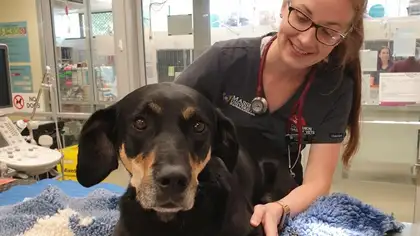
Companion Animal Hospital
From cats and dogs to birds and reptiles, the hospital cares for sick and injured pets of all shapes and sizes. This includes:
- health checks
- spays and neuterings
- vaccinations.
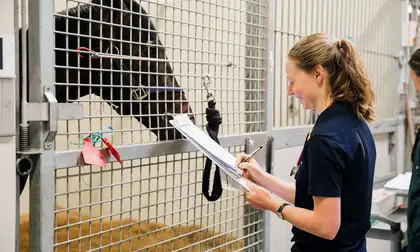
Equine Veterinary Clinic
The clinic offers a broad range of medical and surgical expertise. It includes:
- patient boxes and paddocks
- surgery
- separate isolation unit.
Students can assist with or observe procedures.
Location: Manawatū campus
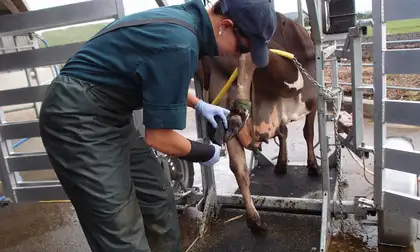
Farm Services Clinic
Expert care for livestock and lifestyle animals such as alpacas, goats and poultry. Our new hospital includes:
- patient boxes and yards
- surgery
- separate farm animal isolation unit.
Students assist with or observe procedures.
Jobs with animals
Careers focus on keeping animals fed, healthy and productive, from farm animals to household pets, and protecting wildlife from factors that threaten their very existence. Our graduates go everywhere from agribusiness to pet food companies, wildlife sanctuaries to zoos, breeders to livestock exporters. Some do research or policy work for charities, government agencies or industry bodies.
Job prospects are good. Agriculture is a cornerstone of Aotearoa New Zealand's economy, with high demand for specialists focused on making sure animals are healthy and productive. There's also demand for those who help protect our unique biodiversity.
Animal careers include:
- animal scientists, who specialise in areas such as breeding, nutrition or welfare
- conservation or ecology jobs, which focus on protecting sustainable animal ecosystems
- livestock or agribusiness consultants
- equine careers, including horse racing or breeding
- veterinarians.
Annual salary ranges for jobs
- Animal scientist - $65,000 to $150,000
- Agricultural consultant - $50,000 to $150,000
- Environmental scientist – $58,000 to $165,000
- Veterinarian (new graduates) - $75,000-105,000
- Zookeeper – $48,000 to $117,000
- Zoologist – $57,000 to $142,000
Salary ranges disclaimer
Indicative pay rates are:
- in New Zealand dollars
- based on careers.govt.nz data.
Which animal science qualification?
Examples of where our qualifications may take you.
| Jobs | Examples of what you could study |
|---|---|
| Agricultural consultant | Bachelor of Agricultural Science |
| Animal scientist |
Bachelor of Animal Science (Animal Genetics and Breeding) Bachelor of Animal Science (Animal Nutrition and Growth) Bachelor of Animal Science (Animal Welfare) |
| Animal scientist specialising in horses | Bachelor of Animal Science (Equine Science) |
| Conservation or ecology specialist | Bachelor of Science (Ecology and Conservation) |
| Environment scientist |
Bachelor of Science (Ecology and Conservation) Bachelor of Science (Zoology) |
| Policy analyst |
Bachelor of Science (Ecology and Conservation) Bachelor of Science (Zoology) |
| Zoologist |
Bachelor of Science (Ecology and Conservation) Bachelor of Science (Zoology) |
| Veterinarian | Bachelor of Veterinary Science |
Accreditations and rankings

ShanghaiRanking - agricultural science
Massey University is ranked No.1 in New Zealand for agricultural science by ShanghaiRanking's Global Ranking of Academic Subjects.
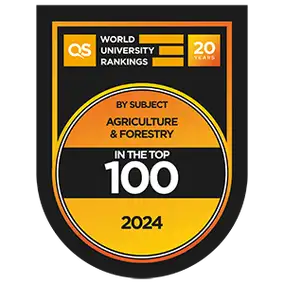
QS Ranking - Agriculture and Forestry
Massey is world-ranked and New Zealand’s No 1 university in agriculture according to QS (Quacquarelli Symonds) rankings.
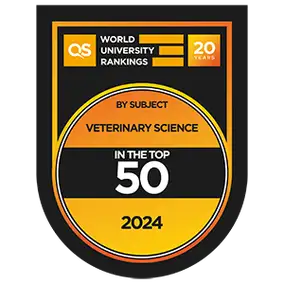
QS Ranking - Veterinary Science
The Veterinary School is ranked by QS (Quacquarelli Symonds) as 21st in the world for veterinary science, the highest ranked school in the southern hemisphere.
Get an information guide
Download our guide to find out more about studying animal and veterinary at Massey.
